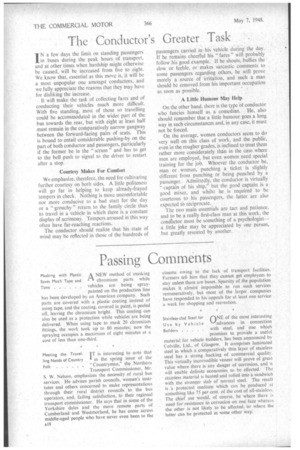The Conductor's Greater. Task
Page 20

If you've noticed an error in this article please click here to report it so we can fix it.
IN a few days the limit on standing passengers in buses during the peak hours of transport, and at other times when hardship might otherwise be caused, will be increased from five to eight. We know that, essential as this move is, it will be a most unpopular one amongst conductors, and we fully appreciate the reasons that they may have for disliking the increase.
It will make the task of collecting fares and of conducting their vehicles much more difficult. With five standing, most of those so travelling could be accommodated in the wider part of the bus towards the. rear, but with eight at least half must remain in the coMparatively narrow gangway between the forward-facing pairs of seats. This is bound to entail considerable pushing-by on the part of both conductor and passengers, particularly if the former be in the " scrum " and has to get to the bell push to signal to the driver to restart after a stop.
Courtesy Makes For Comfort We emphasize, therefore, the need for cultivating further courtesy on both sides. A little politeness will go far in helping to keep already-frayed tempers in check. Nothing is More uncomfortable nor more conducive to a bad star_t for the day or a " grouchy " return to the family circle than to travel in a vehicle in which there is a constant display of acrimonY. Tempers aroused in this way often have far-reaching reactions.
The conductor should realize that his state of mind may be reflected in those of the hundreds of passengers carried in his vehicle during the day.• If he remains cheerful his " fares" will probably follow his good example. If he shouts, bullies the slow. or feeble, or makes sarcastic comments to some passengers regarding others, he will prove merely a source of irritation, and such a man should be removed from his important occupation as soon as possible. .
A Little Humour May Help On the other hand, there is the type "ofconduct& who fancies himself as a comedian. He, also should remember that a little humour goes a long way in such circumstances and, in any case, it must not be forced.
On the average, women conductors seem to do very well on this class of work, and the public, even in the rougher grades, is inclined to treat them rather more considerately than in the case where men are employed, but even women need special training for the job. Whoever the conductor be, man or woman, punching a ticket is slightly different from punching or being punched by a passenger. Admittedly, the conductor is virtually "captain of his ship," but the good captain is a good mixer, and whilst he is required to becourteous to his passengers, the latter are also expected to reciprocate.
The two main essentials are tact and patience, and to be a really first-class man at this work, the condUctor must be something of a psychologist— a little joke may be appreciated by one person, but greatly resented by another.












































































